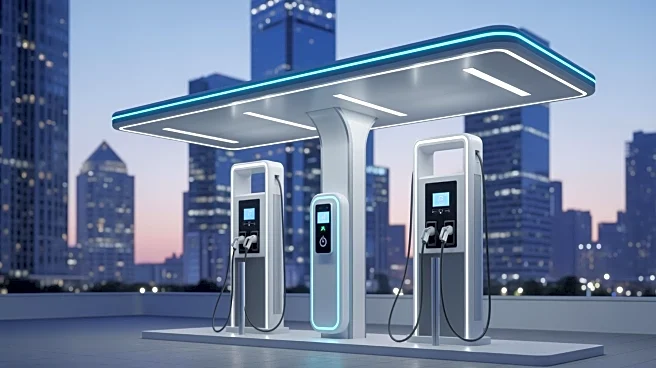What's Happening?
Rivian Automotive has reported third-quarter results that surpassed Wall Street expectations, achieving a consolidated revenue of $1.56 billion, which marks a 78% increase year-over-year. The company delivered 10,270 vehicles, reflecting a 32% rise from
the previous year. Despite a $130 million loss in automotive gross profit, Rivian's software and services revenue surged by 324% to $416 million. The company is progressing with its R2 model, planning to expand its production facility in Normal, Illinois, to accommodate future production needs.
Why It's Important?
Rivian's performance is significant as it highlights the company's ability to grow its revenue and vehicle deliveries despite challenges in the automotive sector. The increase in software and services revenue indicates a successful diversification strategy, which could provide a buffer against fluctuations in vehicle sales. Rivian's expansion plans for the R2 model production facility suggest a commitment to scaling operations, which could enhance its competitive position in the electric vehicle market. Investors and stakeholders are likely to view these developments positively, as they signal potential for long-term growth and profitability.
What's Next?
Rivian has maintained its guidance for 2025, including an adjusted earnings loss between $2 billion and $2.25 billion, and vehicle deliveries ranging from 41,500 to 43,500 units. The company plans to launch its new R2 midsize vehicle in the first half of next year at its Illinois plant. Rivian's CEO, RJ Scaringe, has expressed confidence in the company's liquidity position, which is crucial for the upcoming R2 launch. The company does not anticipate delays in production due to concerns about rare earth minerals or chips from China-owned suppliers.
Beyond the Headlines
Rivian's strategic partnership with Volkswagen and its focus on software and services could have long-term implications for the automotive industry, potentially setting a precedent for other companies to follow. The emphasis on software revenue highlights a shift towards integrating technology and services in the automotive sector, which could lead to new business models and revenue streams. Additionally, Rivian's expansion plans may contribute to job creation and economic growth in the regions where it operates.
















